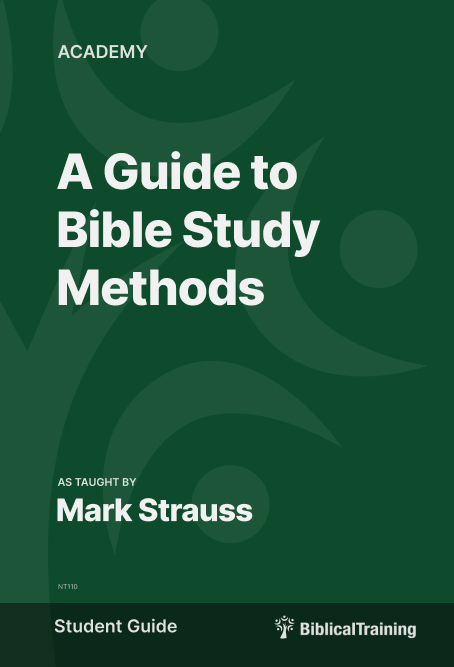About This Class
This class asks the questions of what is Bible study? Why do we study these specific 66 books? What type of literature are we studying? What are the practical steps we should take? How do we determine a word’s meaning? How do we apply the text to our lives? These questions and more are answered in this course.
This is the second class in the sequence on hermeneutics. The class entitled Hermeneutics should be attended first. There is overlap between the two classes, but the first is more about your approach to studying the Bible and this class is more a practical, hands-on look at Bible study.
Other Recommended Reading:
How to Read the Bible for All Its Worth, Fourth Edition, Gordon Fee and Douglas Stuart
Mark Strauss

Lessons
- 0% Complete
It is important to recognize your presuppositions when you study and interpret the Bible. The writings of the Bible reflect diversity in authorship, genre and cultural background. The common theme that unifies the Bible as a whole focuses on the story of creation, fall and redemption.
0% Complete - 0% Complete
Hermeneutics is the science and art of biblical interpretation. The science of hermeneutics provides methods, rules, and a measure of objectivity while the art of hermeneutics speaks to the skill that is learned through practice. The goals of exegesis are to determine the meaning of a passage in its original context, and to determine the significance of the passage for today.
0% Complete - 0% Complete
The first goal of hermeneutics is to determine the author’s intended meaning of the text. The interpretation process must take into account the genre of the literature and the historical and literary context. The meaning of the text controls our application. In this lecture, you will get a glimpse of the process of interpretation by looking at four principles of exegesis, the four steps we take to cross the bridge from our contemporary culture to the original context of the Biblical authors.
0% Complete - 0% Complete
In this lecture, we get into the practical details for how to exegete a passage. Dr. Strauss explains the first four (of ten total) steps for English Bible exegesis: 1) identify the genre, 2) get the big picture, 3) develop a thesis statement and 4) outline the progress of thought. This lecture teaches new skills and provides examples for you to put them into practice.
0% Complete - 0% Complete
The final six steps in the exegesis process are consulting secondary sources, analyzing syntactical relationships, analyzing key terms and themes, resolving interpretive issues and problems, evaluating your results from the perspective of wider contextual and theological issues, and summarizing your results. (At the 26-minute mark, the verse reference, John 14:6 should be John 14:26.)
0% Complete - 0% Complete
Dr. Strauss leads us into exploring the riches of Biblical words in this lecture. He explains some common misconceptions and gives us safeguards so that we do not wander into exegetical fallacies. If you want to know the way forward in Biblical exploration, then listen in as Dr. Strauss outlines the basic principles for doing Biblical word studies correctly.
0% Complete - 0% Complete
In this lesson, Dr. Strauss discusses two extremes to avoid when applying Scripture. He also gives us five principles to guide our contextualization of a particular passage. Listen in and grow in your ability to apply Scripture in your context to your life in meaningful ways.
0% Complete
Class Resources
Recommended Books
A Guide to Bible Study Methods - Bible Study
This guide is intended to be used with the free class from BiblicalTraining.org. Bible Study Methods